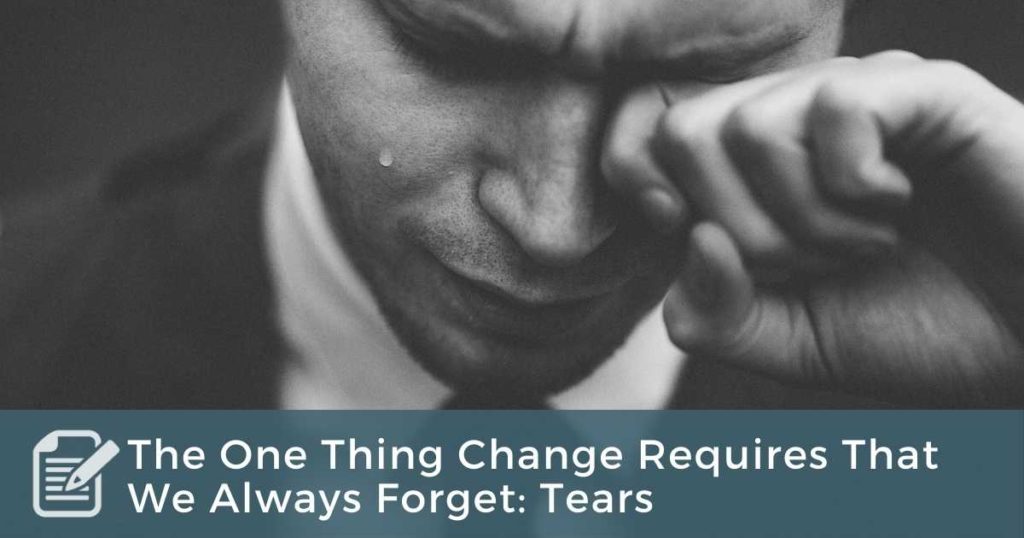This is a six part series. I’ll put the links to the rest for your convenience.
- Change Is Unavoidable. This Will Affect You.
- Three Ways You Can Prepare for the Coming Change Storm
- What To Do When the Change Tornado Has You Spinning
- How to Avoid Drowning in Change
- The One Thing Change Requires That We Always Forget. Tears.
- The Road Ahead is Littered with Foolish Bones

Jesus wept, but not at first. When he first hears of his dear friend Lazarus’ illness, he delays. Jesus had come with a purpose, and that purpose didn’t allow him the freedom that most of us desire. When Jesus arrives, Lazarus is already dead. The first person he encounters is Lazarus’ sister Martha. She hits him in the chest with these words, “If you had been here, my brother would not have died.”
As a leader who is trying to bring change to the world, you are going to get hit with words like these. And frankly, they hurt. Jesus responds to Martha with a vision for the future. A good change agent always needs to be ready with vision for the future.
The second person Jesus encounters is Lazarus’ sister Mary. She dearly loved Jesus. Her first words are the same as her sister’s. “If you had been here, my brother would not have died.” If Martha hit Jesus in the chest, Mary follows with a right cross to his chin. Jesus desire to change the world has made him too unavailable.
This time, instead of painting a picture of future hope, Jesus says, “Can I go and see where he is buried?” The change agent can’t ignore the present suffering very long. He has to acknowledge that there is real loss. Otherwise he loses all credibility.
At the grave, it isn’t stated, but I think Jesus may hear the voice of Lazarus himself, “If you had been here, I wouldn’t have died.” Jesus confronts his own emotion as he stands at the grave of one of his closest and dearest friends.
And then, Jesus wept.
I know there is more to this story, but in this, my fifth blog out of six, it is important to address this crucial issue. You must grieve your losses.
Last week, I listened to Paul Lawler, pastor of Christ Church (www.christchurchtv.org) in Birmingham, Alabama talk about the change they made in their church seven years ago. I listened more carefully because Christ Church doesn’t run 4000 on Sunday morning. It runs closer to 400. It is easier for me to relate to the actions of churches that run closer to the size of the average American church, which is around 70.
Christ Church set three goals with metrics that make me fall in love with this church.
· Equip 150 discipleship group leaders in patterns of disciple-making
· Serve the East Lake community in our city for a minimum of 25 years
· Plant 100 churches around the world in 7 years
When Lawler made this change, it didn’t evoke love in everyone. At least 100 people left the church. He lost 25% of his congregation? I can guarantee that sisters like Mary and Martha were coming to Paul and saying things like, “If you hadn’t made this change, my brother would still be attending this church.”
Seven years later, Christ Church is still a little smaller than before. However, they have planted around 140 churches around the world with over 14,000 conversions. They have developed a rhythm for disciple making that is beginning to replicate. And they have begun to serve a struggling part of their city.
Yet when Paul Lawler saw so many people leave, he didn’t pull back from the change, nor did he tell anybody he was glad these folks left. Instead, he wept. He cried. Loss must be grieved. Even Jesus demonstrated this. Jesus wept. And this leads me to a difficult truth, I need to weep.
I need to grieve the loss that is occurring during this change for me.
In the past when I have made a change like this, I focused solely on the future and didn’t spend enough time thinking about what was being lost. I moved on quickly. This time, I wanted to be sure that I finished very well and stayed “present” till the end. But here is what I didn’t plan to do. I didn’t plan to grieve.
I’ve made excuses of why I haven’t needed to grieve. I’m not moving geographically. I’ll still see the people of my church. We can still be friends. While I plan to be gone from the church for a while, there is no reason I can’t come back. There is no reason to grieve because before you know it, I’ll be back in the mix. It is true that I’ll no longer be these people’s pastor, but you know, once a pastor, always a pastor.
But Jesus has led me to a necessary place of grief. The relationships will change. I may not be able to come back to this church. God may call me to another place to serve. I can indeed hear the people of my church saying, “When you leave, many of the things you hold dear are going to die.” And many things will. Jesus has told me that I need to grieve.
When you make a change, you need to have enough emotional health to withstand the repeated statements, “If you would have been here, my brother wouldn’t have died.” Even after Jesus weeps, someone standing off to the side repeats the painful comment. This passage in John 11 is definitely about loss.
As the wave of painful emotion comes in, hold your breath and experience it just like everybody else. And when the wave passes, clear your head and don’t run, stay and cry. The people need to see you grieve the loss. You need to grieve the loss. If you don’t grieve the loss, you will carry the pain into your next season. That is a huge mistake.
Pray for me as I grieve the loss of pastoring a church for 15 great years.



